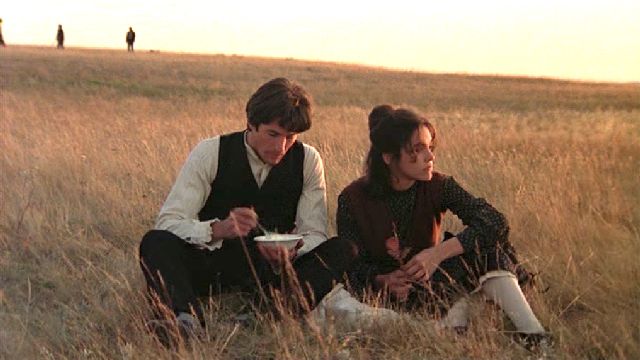Days of Heaven (1978) 
“You’ve got to go through Hell before you get to Heaven”

Director: Terrence Mallick
Cast: Richard Gere, Brooke Adams, Sam Shepard
Synopsis: A hot-tempered farm laborer convinces the woman he loves to marry their rich but dying boss so that they can have a claim to his fortune.
Terence Malick’s Days of Heaven opens with a sequence of photographs that quickly sets the tone for the rest of the film. The snaps look authentic, and are mostly evocative and vivid portraits from the early years of the twentieth century. You can imagine the people in them going about their business after the photograph was taken, leading their ordinary lives. In the movie, Malick takes these lives and contrasts them with the sprawling landscape of the American mid-West, a land of silent rolling wheat fields and huge, flawless skies. This background gives shots of such mundane images as migrant workers hurrying towards a train heading back East an epic quality that belies the ordinariness of their actions, and its elegiac quality corresponds with the perspective of a child for whom all this is strange and new.
Richard Gere plays Bill, a worker in a Chicago steel mill, who is forced to flee with his lover, Abby (Brooke Adams), and younger sister, Linda (Linda Manz), after accidentally killing his foreman during an argument. They eventually arrive at a wheat farm in the Texas panhandle, where Bill secures work for them as farm labourers. To deflect any suspicion and stop people talking, Bill and Abby pretend they are brother and sister.
The work is hard, and the foreman (Robert Wilke) is critical of Bill, but they are mostly happy. One day, Bill overhears a doctor inform the owner of the farm (Sam Shepard) that he only has at best a year to live. Bill is already aware that the farmer has fallen for Abby, and persuades her to marry him so that she will inherit his wealth when he dies. Abby is unsure, perhaps sensing the rift such a move might create between them, but eventually goes along with Bill’s plan. But, once she and the farmer are wed, his health appears to stabilise, and although the married couple, together with Bill and Linda enjoy an idyllic summer together, Bill eventually becomes impatient, and considers taking the matter of his lover’s husband’s health into his own hands…
The fact that it is young Linda who narrates Days of Heaven is perhaps key to getting the most from its story. Linda’s voice sounds prematurely aged, older than its years, even though it’s clear she’s still a child as she speaks. Her narration is rambling, unstructured, full of observations and asides that appear to have little with the images we see. This is because the story of the movie is told through her eyes both visually and aurally. Sometimes she doesn’t understand what we are seeing. Everything about the movie is filtered through the eyes of a child so that at times it feels as though we’re watching a fairy tale unfold – one in which a dying prince lives alone in a remote and lonely castle. When travellers journey beneath the wooden arch to the farmer’s property, they traverse the border between the harsh realities of the outside world and the golden fields of a land which seems fixed in no particular time. Ennio Morricone’s melancholic and evocative score ably serves to reinforce this sense of detachment from the real world, while the visual eloquence of Haskell Wexler and Nestor Almendros’s cinematography has the texture of a dream.
As well as directing, Terence Malick wrote the script for Days of Heaven. The dialogue is restrained, almost sparse, all messages of importance condensed down to a few sentences. Scenes are short, ending unexpectedly, and in this way they resemble memories. You’d think this would disrupt the flow of the narrative, but somehow it enhances it, giving the movie a unique and mesmerising rhythm that draws us in and refuses to release us.
(Reviewed 19th November 2013)
httpv://www.youtube.com/watch?v=LlZDsMCW0U4
